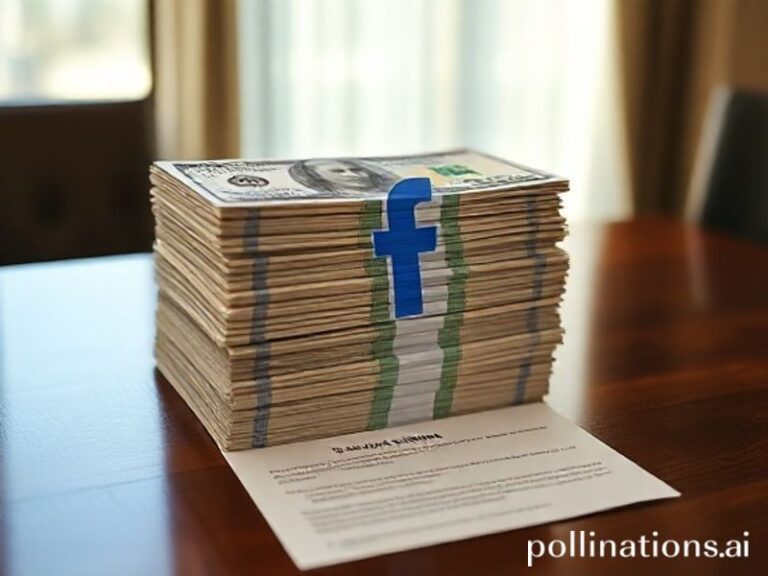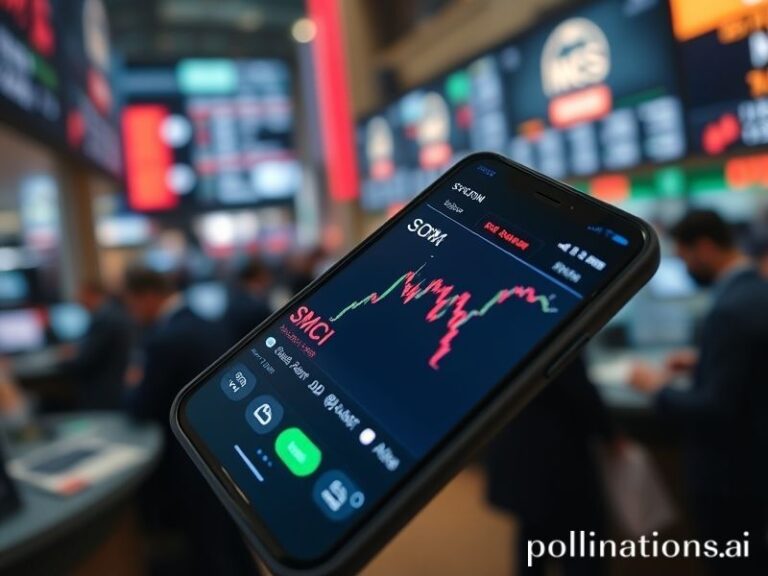Global Echoes of the Nasdaq: How a Sneezing Index Gives the World a Cold
The Nasdaq—an acronym that once sounded like a sneeze but now evokes the same Pavlovian salivation in boardrooms from São Paulo to Singapore—has become the de facto mood ring of late-stage capitalism. When its composite index sneezes, central bankers in Frankfurt reach for the tissues, and TikTok day-traders in Lagos mutter prayers to whatever algorithmic deity they’ve been worshipping that week. It is, in short, the world’s most expensive weather vane, forever spinning to catch the hot air emanating from Palo Alto, Shenzhen, and a thousand glass towers that still insist on calling themselves “campuses” like overgrown toddlers in Patagonia vests.
Consider last Tuesday, when a single semiconductor stock—whose product is less a chip than a geopolitical bargaining token—plunged 8 % on rumors that a Dutch lithography firm had misplaced a shipment of mirrors. Within minutes, the Korean won wobbled, the Taiwanese central bank held an emergency séance, and a hedge fund in Greenwich discovered its risk model was essentially a Magic 8-Ball wearing a Patagonia vest. That such cosmic ripples can be born from what is essentially a glorified mirror maze is either testament to human ingenuity or proof that we’ve collectively agreed to play the largest game of financial telephone in recorded history.
Of course, the Nasdaq isn’t merely American; it’s America exported in 4K resolution, complete with the obligatory subscription fee and end-user license agreement. European pension funds—whose average beneficiary still thinks TikTok is a pocket watch—now allocate double-digit percentages to “growth equities” listed on an exchange whose marquee names manufacture nothing thicker than a software update. Meanwhile, Gulf sovereign wealth funds, tired of yachts and soccer clubs, pour petrodollars into companies whose business models can be summarized as “we lose money, but at scale.” In an ironic twist of fate, the same hydrocarbons financing these bets are simultaneously guaranteeing Miami’s eventual submersion, ensuring future shareholders will need a snorkel to attend the annual meeting.
The Chinese have tried, bless them, to replicate the Nasdaq at home with the STAR Market, where patriotic investors can lose yuan instead of dollars. Yet even Beijing’s censors can’t quite replicate the je ne sais quoi of watching a 28-year-old in a hoodie become richer than Denmark because his app helps teenagers lip-sync to copyrighted music. Instead, Chinese regulators settle for the occasional vanishing billionaire, a crude but effective circuit breaker that the SEC might envy on days when Elon decides Twitter is a suitable venue for securities disclosure.
Emerging markets, ever the latecomers to a party already littered with red Solo cups, now chase “Nasdaq proxy” ETFs the way previous generations chased gold or AK-47s. Nigerian fintech entrepreneurs quote Cathie Wood like she’s a minor prophet; Chilean pensioners day-trade in between earthquakes. And when the index finally corrects—as gravity insists it must—the same policymakers who spent years lecturing about moral hazard will discover creative new synonyms for “bailout.” Expect the phrase “too connected to fail” to debut at Davos, sandwiched between panels on sustainability and canapés on sustainability.
All of which raises the question: if the entire planet is long a collection of servers in New Jersey, who exactly is left to be short? The answer, naturally, is the future—those unborn taxpayers already on the hook for today’s margin loans. They’ll inherit not the earth, but the cloud: an ethereal ledger of promises to pay, collateralized by even more ethereal promises to innovate. In the meantime, the rest of us refresh our brokerage apps, applaud politely when numbers go up, and pretend the whole spectacle isn’t just an elaborate ritual for redistributing anxiety.
And so the sun never sets on the Nasdaq empire—only on its users’ circadian rhythms. Somewhere a quant in Reykjavik is training an AI to predict which emoji Elon will tweet next, while a pensioner in Perth checks her balance at 3 a.m. because the market, like insomnia, never truly sleeps. The world spins, the index ticks, and we all hold our breath, hoping the mirrors don’t crack.







